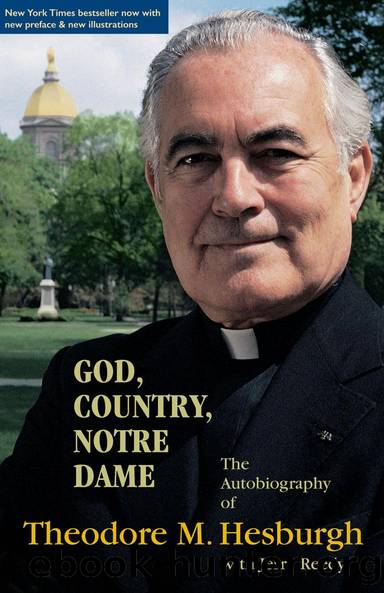God, Country, Notre Dame by Theodore M. Hesburgh Jerry Reedy

Author:Theodore M. Hesburgh, Jerry Reedy [Theodore M. Hesburgh, Jerry Reedy]
Language: eng
Format: epub
Tags: Biography & Memoir, Reference, Nonfiction, History, Americas, United States, 20th Century, Historical
ISBN: 9780268088040
Publisher: University of Notre Dame Press
Published: 2018-06-25T04:00:00+00:00
10 The Catholic Laity
From 1965 to 1967 I was in the anomalous position of being president of the University of Notre Dame while leading the efforts to give away our beloved university, lock, stock, and barrel, as they say. The university had been founded more than one hundred years before, in 1842, by a young priest named Edward F. Sorin of a French missionary order called the Congregation of Holy Cross. He started the school on the edge of St. Maryâs Lake in the northern Indiana wilderness in three dilapidated log buildings. He had about three hundred dollars in his pocket at the time. By the 1960s the University of Notre Dame had grown considerably; its net worth was something in excess of half a billion dollars, and it was still owned, operated, and controlled by the priests of the Congregation of Holy Cross. It had become, to my mind at least, the premier Catholic university in the United States. And, to my mind, the time had come for the priests of Holy Cross to relinquish ownership and control of the university to a lay board of trustees who would be better equipped to oversee its future well-being.
Only a broad, long view of the future of Notre Dame could bring into focus the benefits of drawing the laity into the decision-making process which would govern this Catholic university. Many protested at the time and many questioned that decision after it was made, more in bewilderment than in protest.
âWhy, after more than a century of operation by the priests of Holy Cross, did you turn control of the university over to a lay board of trustees?â That was the question.
The answer was very simple: Vatican II had said that laypeople should be given responsibility in Catholic affairs commensurate with their dedication, their competence, and their intelligence. Many people may not have taken that seriously, but we did. For me, it was the most natural thing in the world. In fact, I had advocated a greater role for the laity ever since I wrote my doctoral dissertation on the subject two decades earlier.
And there were very practical reasons, too, which I believe were part of the thinking of Vatican II. Until that time, both at Notre Dame and throughout the entire Church, clerics had the top positions and the primary responsibility for virtually everything. But times had changed. Running a university, which had once been relatively simple, had now become complex and was getting more so almost by the day. Those three log cabins of Father Sorinâs had grown into more than one hundred substantial buildings, a radio and TV station, fire and police departments, a massive food service operation, a highly competitive varsity athletics program, a bookstore, a hotel, seven thousand acres of property in Wisconsin, academic facilities in London, Rome, and Jerusalem, and a program for the future that would require us to raise, invest, and spend hundreds of millions of dollars each and every year. We had reached the point where Notre Dame could no longer be run by a handful of Holy Cross priests.
Download
This site does not store any files on its server. We only index and link to content provided by other sites. Please contact the content providers to delete copyright contents if any and email us, we'll remove relevant links or contents immediately.
Hit Refresh by Satya Nadella(9138)
When Breath Becomes Air by Paul Kalanithi(8447)
The Girl Without a Voice by Casey Watson(7889)
A Court of Wings and Ruin by Sarah J. Maas(7847)
Do No Harm Stories of Life, Death and Brain Surgery by Henry Marsh(6941)
Shoe Dog by Phil Knight(5270)
The Rules Do Not Apply by Ariel Levy(4970)
A Higher Loyalty: Truth, Lies, and Leadership by James Comey(4964)
Hunger by Roxane Gay(4928)
Tuesdays with Morrie by Mitch Albom(4784)
Everything Happens for a Reason by Kate Bowler(4743)
The Immortal Life of Henrietta Lacks by Rebecca Skloot(4589)
Millionaire: The Philanderer, Gambler, and Duelist Who Invented Modern Finance by Janet Gleeson(4478)
How to Change Your Mind by Michael Pollan(4357)
All Creatures Great and Small by James Herriot(4323)
The Money Culture by Michael Lewis(4207)
Man and His Symbols by Carl Gustav Jung(4137)
Elon Musk by Ashlee Vance(4128)
Tokyo Vice: An American Reporter on the Police Beat in Japan by Jake Adelstein(3996)
